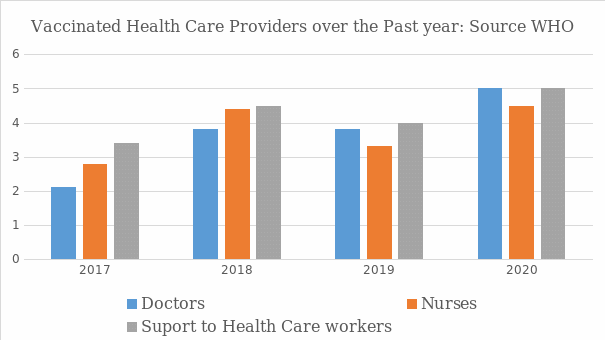Annually, it is estimated that at least one billion influenza cases (flu) are experienced annually. According to the provided statistical records, 10% of the total cases usually succumb to the disease and its related complications (Black et al., 2018). The highly affected group by the disease are the health care workers. These health care professionals are attacked by the flue in their lines of duty. Therefore, providing vaccine is the number one approach to treat the condition. In most cases, the influenza immunization is effective and capable of preventing health care workers from the flu attack. This research paper aims at explaining why the personnel need to receive the flu vaccine. The provided results will be based on several theories, principles, and evidence to support the position.
The Nature of the Illness
Influenza is a viral respiratory disease, which can be easily spread to other people through the droplets when they sneeze, talk, or cough. These substances may land on the next person’s nose or mouth. Healthy people may depict the virus’s symptoms soon after 5-7 days of contracting the illness (Black et al., 2018). It means they can pass the infection to others when they are still asymptomatic. These unique characteristics make the ailment one of the most complex conditions.
Theories, Evidence, and Ethical Principles
According to the social theory, health care workers are vastly sociable with patients and co-workers. As a result, they are highly susceptible to contracting the influenza virus from infected patients (Black et al., 2018). In the circumstances when these professionals contract the infection, they can easily spread the disease. Consequently, health care workers are most likely to be hospitalized and, sometimes, die. According to the most recent statistical results presented, the number of infected health care workers has continued to receive immunization against the disease. The graph provided below is a typical indication on how the stability of the vaccinated health care workers has been achieved against the number of influenza infection over the past four years. The graph proves that by being vaccinated, health care professionals will manage to protect themselves, patients, and family members.

Ethically, health care workers are expected to treat every sick member of society. While subscribing to the idea of vaccination, they must ensure that patient’s well-being becomes the priority. Immunization forms the hallmark of protecting patients against any attack and spread of the virus. In fact, it is the only option which can help reduce the number of flu-related illnesses and deaths, which have been experienced over the past years. Finally, the health care workers will be setting a good example to the entire society on protecting the sanctity of life.
Based on the presented facts, it is evidently clear that the health care workers’ vaccination against the influenza virus is a noble idea. The vaccination method will manage to protect the health care personnel against the attack and the spread of the disease. Consequently, it will be a powerful mechanism of safeguarding the patients against any possibility of contracting the infection. Therefore, through the Ministry of Health, the federal government should sensitize health care professionals and provide them with the best treatment opportunities. The application of the above recommendations will reduce the unprecedented level of spread and death caused by such diseases.
Reference
Black, C. L., Yue, X., Ball, S. W., Fink, R. V., de Perio, M. A., Laney, A. S., Williams, W. W., Graitcer, S. B., Fiebelkom, A. P., & Devlin, R. (2018). Influenza vaccination coverage among health care personnel—the United States, 2017–18 influenza season. Morbidity and Mortality Weekly Report, 67(38), 1050-1054. Web.